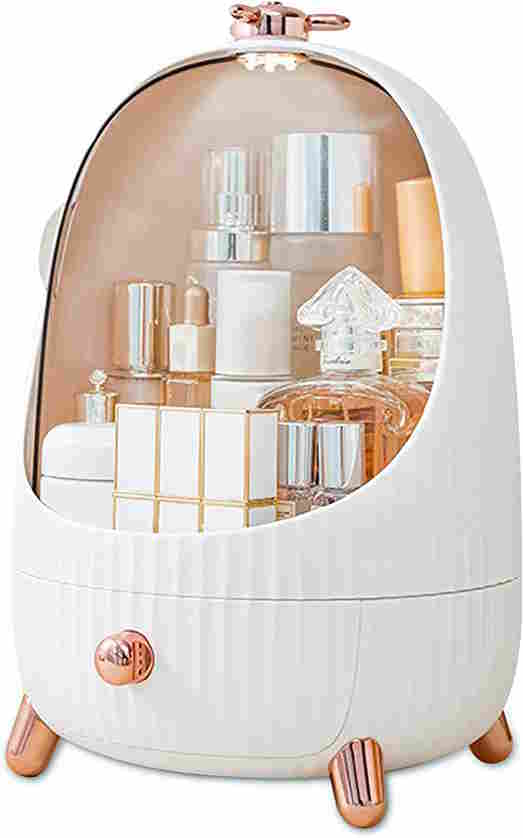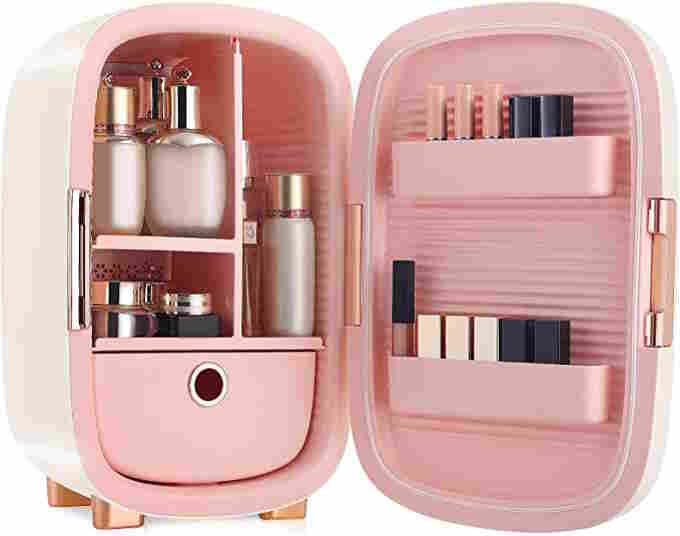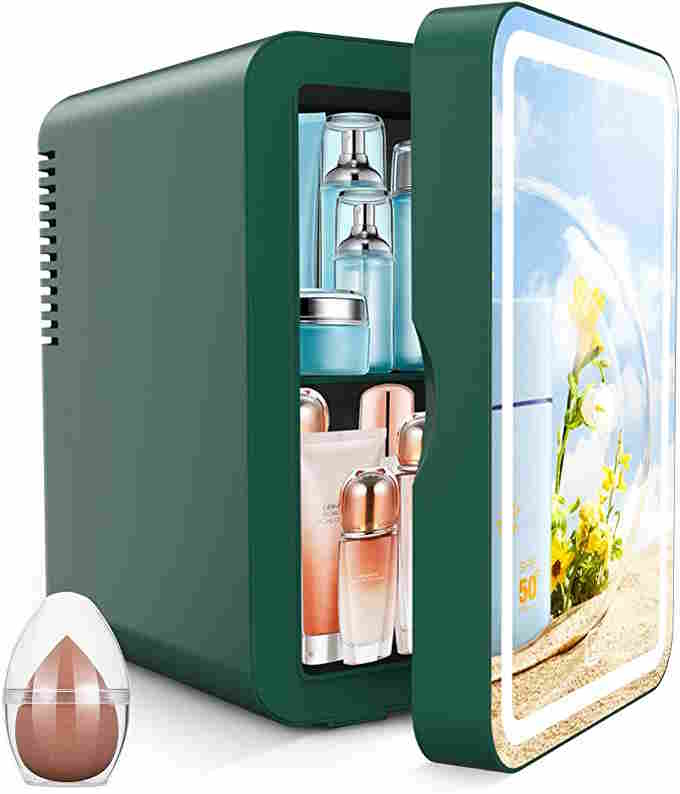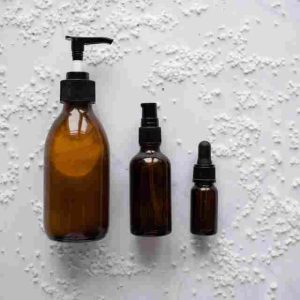Introduction
If you’re someone who prioritizes skincare, you’ve probably heard about the skincare fridge trend. Keeping your skincare products in a mini-fridge designed for storing skincare can help prolong their shelf life, and can also be a refreshing addition to your morning routine. But what exactly should you be putting in there? Let’s take a look at some of the best items to store in a skincare fridge.
Serums and Eye Creams
Serums and eye creams can benefit from being stored in a cooler environment, especially during the summer months where the heat can cause them to break down. Not only do they feel refreshing when applied cold to the skin, but the cooler temperature can help reduce puffiness and dark circles.
- Vitamin C serums can be stored in a skincare fridge
- Retinol serums can be stored in a skincare fridge
- Hydrating serums can be stored in a skincare fridge
- Eye creams can be stored in a skincare fridge
Sheet Masks
Sheet masks are another skincare essential that can be stored in the fridge. Applying a chilled sheet mask can help tighten the pores, boost radiance, and calm the skin. Plus, the added coolness can feel incredibly soothing on a hot day.
Mists and Toners
If you’re someone who loves a refreshing spritz throughout the day, a skincare fridge might be just the thing for you. Storing your toners and facial mists in the fridge can help give you a more refreshing experience when you use them. It can also help calm redness from inflammation or acne.
| What to Put in the Skincare Fridge | What Not to Put in the Skincare Fridge |
|---|---|
| Serums and eye creams | Oil-based products, such as cleansing oils |
| Sheet masks | Products with preservatives that don’t require refrigeration |
| Mists and toners | Products with active ingredients that can become unstable in cold temperatures |
There are several skincare products that are perfect for storage in a skincare fridge. Just be sure to avoid putting anything in there that could potentially become unstable or cause harm to your skin. When in doubt, check the product label or contact the manufacturer to ensure that it’s safe for refrigeration. With the right products, a skincare fridge can be a refreshing and beneficial addition to your skincare routine.
What Not to Put in a Skincare Fridge?
If you own a skincare fridge, it can be tempting to store all of your beauty products in it. After all, who wouldn’t want their skincare to feel extra refreshing? However, there are certain products that you should avoid putting in your skincare fridge. Here’s a list of what not to put in a skincare fridge:
- Oils: While storing your facial oils in a cool place might seem like a good idea, it can actually cause them to solidify or even go rancid. Keep your oils at room temperature instead.
- Nail polish: Storing your nail polish in the fridge can cause it to thicken and become gloopy. Plus, the cool temperature can cause condensation to form inside the bottle, which can dilute the formula.
- Eye drops: Storing your eye drops in the fridge might seem like a good way to cool and soothe irritated eyes, but the cold temperature can actually cause the preservatives in the drops to break down, making them less effective.
Other products that you might want to avoid putting in your skincare fridge include:
| Perfumes and fragrances | Lipsticks | SPF sunscreen |
|---|---|---|
| Perfumes and fragrances can be negatively affected by changes in temperature. Plus, the cold can cause them to thicken and become gloopy, making them difficult to apply. | Storing your lipsticks in the fridge can cause them to dry out and become cakey, making application difficult and uncomfortable. | SPF sunscreen should be stored at room temperature to ensure that the active ingredients remain stable and effective. Storing it in the fridge can cause the formula to separate or solidify, making it difficult to apply properly. |
While a skincare fridge can be a great addition to your beauty routine, it’s important to know what not to put in it. Keeping your products at their ideal temperature can help to prolong their shelf life and effectiveness, so make sure to store each item in the way that’s best for it.
What Can You Put in a Skincare Fridge on the Cold Setting?
When it comes to skincare, there are many products that can benefit from being in a skincare fridge, which is typically set at a chilly temperature between 35-40°F. Keeping certain products in the fridge can not only extend their shelf life, but also provide a refreshing and depuffing effect when applied to the skin. Here are some of the items you can put in your skincare fridge on a cold setting:
- Face Masks: Keeping your face masks in the fridge can enhance their cooling and soothing effects when applied to the skin. Plus, it can help preserve their ingredients and extend their shelf life.
- Eye Cream: The cool temperature of the fridge can help reduce puffiness and tighten the skin around the eyes.
- Toner: Refrigerating your toner can provide a refreshing and cooling sensation when applied to the skin, especially in hot weather.
- Mist: If you use a facial mist, storing it in the fridge can provide a cooling effect that soothes and revitalizes your skin.
- Serums: Most serums can benefit from being stored in a skincare fridge, especially those that contain Vitamin C, which can easily oxidize and lose its potency in heat and light.
However, there are some skincare products that are not recommended to be stored in a fridge, even on the cold setting. Here are some items that you should keep away from your skincare fridge:
- Natural Oils: Natural oils like coconut oil, argan oil, and olive oil can harden and solidify when stored in a cold temperature, making them difficult to use and apply.
- Foundation: Freezing temperatures can cause the emulsion in liquid foundation to break down, resulting in a separated and unusable product.
- SPF: Sunscreen and SPF products usually have a shelf life of around a year, but storing them in a fridge can cause them to lose their effectiveness and potency.
If you’re unsure about whether a certain product can be stored in a skincare fridge, it’s always best to check the label or consult with the manufacturer. With the right items stored in the fridge, you can give your skincare routine an added boost of freshness and effectiveness.
Can I Put Vitamin C Serum in the Fridge?
As a skincare enthusiast, you might have come across the idea of keeping your skincare in a fridge to extend their shelf life and enhance their effectiveness. However, you might be hesitant to put certain skincare products like Vitamin C Serum in the fridge. So, can you put Vitamin C Serum in the fridge?
Before we get into the specifics of putting Vitamin C Serum in the fridge, let’s first understand what it is and its benefits. Vitamin C Serum is a holy grail in the skincare industry because of its antioxidant properties. It is effective in brightening the skin, fading dark spots, and protecting it from environmental damage. Storing it properly is essential to preserve its potency and prevent oxidation.
Now, coming back to the question, yes, you can put Vitamin C Serum in the fridge. In fact, storing it in a cool and dark place can slow down its oxidation process, making it last longer. The lower temperature can also soothe the skin and reduce inflammation on application. However, make sure you store it in the door or the back of the fridge away from any direct light or heat source.
While storing your Vitamin C Serum in the fridge can have several benefits, there are a few things to keep in mind. Firstly, don’t freeze it as it will damage the formula and render it ineffective. Secondly, make sure you keep it away from food and other beauty products to prevent contamination. Lastly, always check the expiry date and discard the product if it has expired.
Keeping your Vitamin C Serum in the fridge is a good idea to extend its shelf life and boost its effectiveness. Just ensure that you store it properly and avoid freezing it. So, next time someone asks you “can you put Vitamin C Serum in the fridge?” – you know the answer!
Can I Put Food in My Skincare Fridge?
Have you recently purchased a skincare fridge for your beauty products? If you are new to the concept of skincare fridges, then you may be wondering what items can or cannot be stored in them. One question that may arise is – Can I put food in my skincare fridge? The answer is yes, but…
Before you start storing your food alongside your skincare products, it’s essential to consider a few factors. Firstly, make sure that you do not mix your food items with your beauty products. It’s best to keep them separated to avoid contamination. You can do this by using different sections or shelves in your fridge.
- Next, consider the temperature of your fridge. The recommended temperature for most skincare products is between 40 and 45 degrees Fahrenheit. However, certain food items may need to be stored at a lower temperature. It’s best to make sure that your skincare fridge has an adjustable thermostat to cater to different items’ temperature requirements.
- Lastly, make sure that you only store non-perishable food items in your skincare fridge. Items like fruits and vegetables need to be stored in lower temperatures but also have a short shelf-life. Meanwhile, items like snacks and condiments can be stored for longer periods.
Although storing your food in a skincare fridge may seem like a hassle, it can be a convenient way to keep your snacks closer to you. However, make sure that your skincare products are your primary priority as food items don’t belong in a skincare fridge, to begin with.









